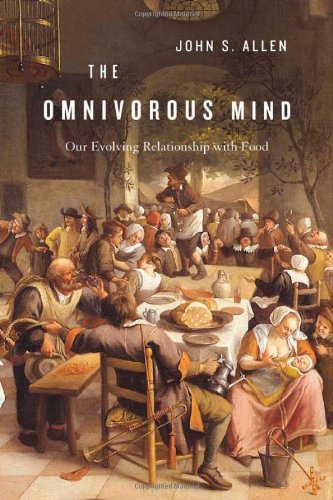
- Publisher: Harvard University Press
- Available in: Hardcover, Kindle
- Published: May 30, 2012
In this gustatory tour of human history, John S. Allen demonstrates that the everyday activity of eating offers deep insights into human beings’ biological and cultural heritage.
We humans eat a wide array of plants and animals, but unlike other omnivores we eat with our minds as much as our stomachs. This thoughtful relationship with food is part of what makes us a unique species, and makes culinary cultures diverse. Not even our closest primate relatives think about food in the way Homo sapiens does. We are superomnivores whose palates reflect the natural history of our species.
Drawing on the work of food historians and chefs, anthropologists and neuroscientists, Allen starts out with the diets of our earliest ancestors, explores cooking’s role in our evolving brain, and moves on to the preoccupations of contemporary foodies. The Omnivorous Mind delivers insights into food aversions and cravings, our compulsive need to label foods as good or bad, dietary deviation from “healthy” food pyramids, and cross-cultural attitudes toward eating (with the French, bien sûr, exemplifying the pursuit of gastronomic pleasure).
To explain, for example, the worldwide popularity of crispy foods, Allen considers first the food habits of our insect-eating relatives. He also suggests that the sound of crunch may stave off dietary boredom by adding variety to sensory experience. Or perhaps fried foods, which we think of as bad for us, interject a frisson of illicit pleasure. When it comes to eating, Allen shows, there’s no one way to account for taste.
Reader Reviews
A mind blowing book! As the author of The Low Carb Revolution: Why the Secret to Losing Weight is to Fall Back in Love With Yourself! I have a deep understanding of how the body interacts with what we put into it, but John S. Allen has taken my thinking about food to a whole new dimension!
He brilliantly describes how we each build up our own internal Food Model, which helps us navigate the otherwise overwhelming complexity we face each day about what to eat and what not to eat. At the heart of any individual’s food model lay our deepest memories of what and how we ate during our childhood. As we progress through life, our food model can either evolve–especially if we expose ourselves to new and different food models from other countries and cultures–or it can remain narrow and unfulfilling.
He shows again and again that for all the time we spend thinking about food, we never really “think” about it in any kind of meaningful way…but this book will certainly help change that!
—John McLean
Why is it that I like some foods at the very first bite, and dislike others, sometimes before I’ve even smelled them? As a practical matter, I’ve tried many different foods over my lifetime, often those that I “knew” I wouldn’t like — and often developed a taste for those initially repugnant foods. But that was more a matter of will power, of proving to myself that I was truly an omnivore, a person able to eat anything other people enjoyed.
That left me still with the basic question: why were there foods I “knew” I wouldn’t like.
John Allen provides a fascinating answer: food is a matter of the mind, much more than a matter of our palate (our senses of smell and taste) or our stomachs. His analysis of how it all works made this book an absolute page turner for me.
—Robert C. Ross